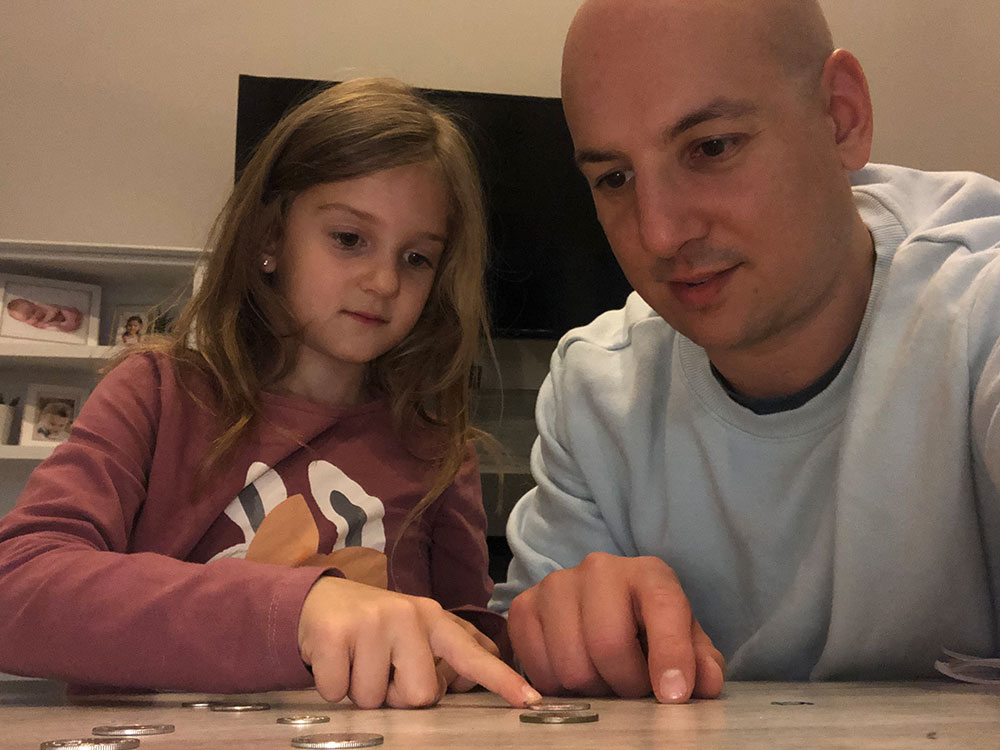by Chad Butnari
Are you talking to your kids about money? If so, are you being intentional about your messaging?
A couple of weeks ago my wife and I were having a discussion about money. If I’m being honest, it was more of a light argument about spending. I can’t remember the exact details, but I was saying we shouldn’t buy something, and she was arguing we should. My wife and I have a tendency to disagree about what is important at times. I then said something like, “we don’t have money for that.” These are pretty typical discussions in our household (as I’m sure in many others) so I didn’t think much of it until my 6-year-old daughter Olivia said, “Daddy are we out of money?”
She was genuinely concerned. I didn’t even realize she was listening as she was in the other room playing with her toys. I quickly explained to her that we did have money, Mommy and I just had a disagreement about whether we should buy something. It ended up being a good teaching moment, but it also taught me a lesson. Kids really listen. They may not listen when you ask them to clean up their mess or have a bath, but they sure hear the stuff you don’t necessarily want them to!
This small incident really got me thinking about educating kids around money. I think many people wait way too long to have these conversations with their kids. Many people think that young kids can’t understand money yet, so wait until they are older. I think this is a big problem. You see, in addition to speaking with our clients, we have the opportunity to meet with many of our clients’ children about money as well. We have conversations with them around mortgages, taxes, RRSP’s vs. TFSA’s, and investments. Don’t get me wrong, these are important concepts to understand as one progresses in their financial journey, but the core building blocks are much more basic and tend to come much earlier in life.
I’ve found that I can predict, with a high degree of confidence, which young adults will be financially successful later in life and which ones may struggle a bit. How can I tell? It’s very simple. If their parents are financially responsible, their kids probably will as well. How much they earn, where they live, what career they choose, are much less important indicators. I have seen plenty of young people manage to save substantial amounts of money making $40k per year while others making $120k per year struggle to put away anything.
I believe the financial education process starts young. Basic ideas like saving, being frugal, not allowing a young child to get anything they want, and establishing work ethic, are all extremely important lessons that can be established at a young age and will remain with the child for the rest of their lives. Although our education system is starting to talk about integrating some basic ideas about money into the high school curriculum, it’s not enough. As a result, it puts the onus on parents to teach their kids about money.
This can be challenging for a number of reasons. Maybe the parents aren’t confident with their own knowledge. Or maybe it’s simply a matter of time. Many parents are extremely busy today. Between packing lunches, helping with homework, and getting kids to their activities, life can get chaotic. But I would really encourage parents and grandparents to try to make time to talk to their kids or grandkids about money. This can be done in a variety of ways such as using stories or analogies to get the concept across.
Here are a few points that I believe are particularly important:
- Start early – This doesn’t mean when they graduate high school. Instead, this could start as early as 4 or 5 years old like in my daughters case.
- Discuss it often – Many ppl develop an uncomfortable relationship with money that stems from the fact that it is still a “taboo” subject. It shouldn’t be.
- Be aware of the discussions you are having around children – In my example above, I was not doing this, and this type of behaviour could have a negative impact on kids.
- Be as transparent as possible – You may not want to share every little detail, but as a rule transparency is much better than leaving kids to come up with their own assumptions.
- Develop habits – Instead of finding time to have a big, long conversation about money, just make it a habit to do on a regular basis. Maybe next time you go to the grocery store. Or a good opportunity may be when you pay a child for doing their chores.
Regardless of how you choose to have these conversations, the important thing is that you have them. It doesn’t have to be perfect, and you don’t have to know everything, just start. Kids are listening and they are picking things up. The question is, are they learning healthy habits around money or unhealthy ones?
What many people believe to be simple conversations about money, can be extremely impactful for kids. In fact, it may be the difference between lifelong financial success or, alternatively, financial struggles. I’ve seen both and believe me, it’s worth the effort.




